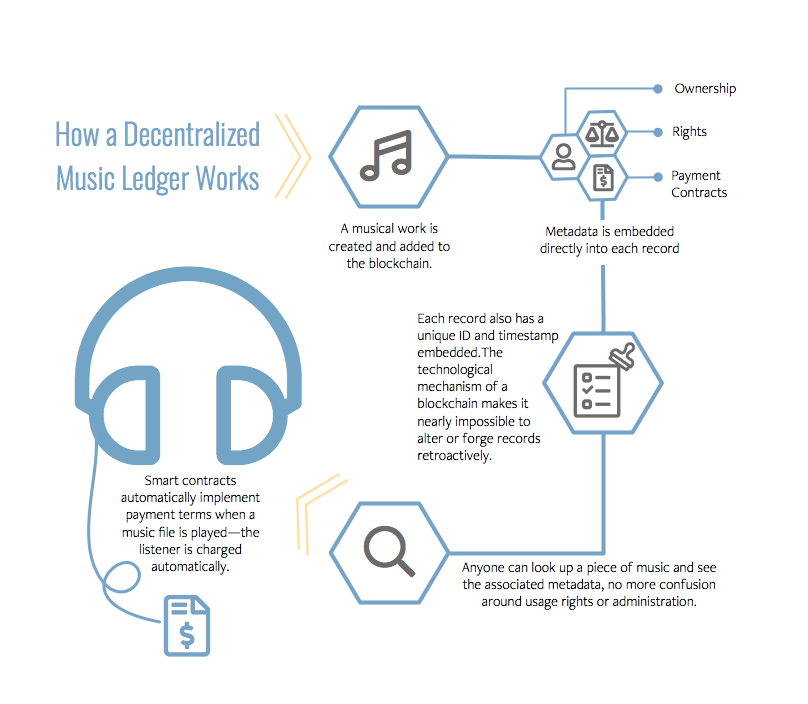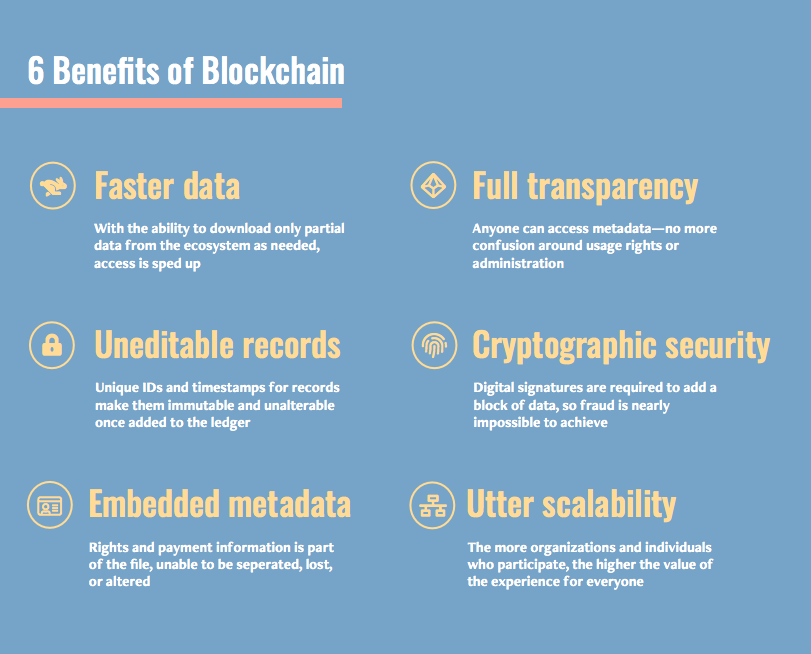Digital Media
Understanding the Music Industry’s Need for Blockchain
This article was co-authored by Teddy Atkins, Jessica Gutierrez, Michael McKone, and Aaron Steinberg, employees at OnPrem, an end-to-end consulting & solution provider.
In the expanding ecosystem of the music industry, a longtime problem has become more and more pressing: no central database exists to keep track of music metadata, making it difficult to track down those with ownership or rights and to ensure they get paid. This conundrum isn’t only a disservice to musical artists; other parties suffer deeply from its inequity. Influential music-makers, societies, publishers, and digital music distributors have spent the last decade in conversation, and some action, to bring harmonization to the music industry, and to create uniformity and reciprocity among players with competing interests.
Created in 2008, the Global Repertoire Database (GRD) was one such endeavor, conceived as a “single source of truth” on music works ownership. In 2014, with the funders getting cold feet, the GRD project was shelved, a debt of $13.7 million in its wake. The factors that contributed to the funder withdrawals are oblique and disputed, but one factor was intense fear of one centralized organization having control. Thus the project failed, the original problem unsolved.
Now, a radical solution is on the horizon: blockchain technology could be the music industry’s revenue savior.
A New Paradigm for Data Ledgers: Blockchain
Technology has certainly created more ways for music stakeholders not to get paid. But ironically, it’s also most certainly the solution to the rights- management conundrum. The tech sector could swoop in to save the day with a technology that’s already disrupting the nance world and showing up across nearly every other domain: blockchain. Bold organizations across industries are innovating better ways to digitally track ownership of assets—most notably, to date, currency, but the other applications are vast and exciting.
According to Business Insider: “The hundreds of pilots and proofs- of-concept currently in motion are but a tip of the iceberg when it comes to potential applications of the blockchain technology.”

The foundational data structure behind blockchain is a digital transaction ledger dispersed among a distributed network of computers, instead of resting on a single provider. Because there’s no single source of ownership, it’s a radically more secure and, at the same time, transparent type of record-keeping, nearly impossible to alter after the fact.
Open to all. Owned by no one. A permanent record of ownerships anchored to a place and time.
A blockchain solution could succeed in the music industry where the GRD failed: the creation of a decentralized ledger for transparent, efficient, and cost-effective rights management, with embedded metadata that cannot be separated from the music files themselves. Ownership, rights, and payment contracts would be attached to each file, and with full transparency, anyone could search on music les and see that metadata – no more confusion around usage rights and payment administration. As songs are created and encoded, a decentralized global database would roar to life.

While a Blockchain solution would still have risks associated with change management, data conversion, and regulations, if implemented properly, it could solve the largest issue of centralized power and greatly benefit the music industry.
In fact, if the GRD project were to run all over again, but this time built on blockchain, the outcome would certainly be very different.
The Move to Blockchain Is Picking Up Speed
“While the protocol doesn’t mandate blockchain, we feel that by far the most interesting implementations are blockchain-based.” – Panos Panay, Berklee College of Music
In 2017, Spotify reached a $30 million settlement with a publishing group over unpaid royalties, and as part of that settlement, agreed to put in place a system for the streaming music service that would do a dramatically better job of matching music streams with creators and owners. Subsequently, Spotify announced an acqui-hire of blockchain technology company Mediachain Labs, which created an open source peer-to-peer database for registering, identifying, and tracking creative works online.
The Open Music Initiative (OMI) is a nonprofit comprised of leading academic institutions, music and media industry organizations, creators, technologists, entrepreneurs and policy experts working together to create an open-source protocol for the uniform identification of music rights holders and creators. The goal is to create a protocol of API specifications to enable industry platform interoperability.
PledgeMusic, Benji Rogers’ online music platform, has published a comprehensive blueprint for the Fair Trade Music Database, an idea for a globally decentralized blockchain-based ledger.
PeerTracks, a music startup, envisions an artist-equity trading system platform that leverages the MUSE blockchain, a ledger specifically engineered for the music industry which is promising artists the ability to claim 90% of their sales income (they currently get 15%).
BitTunes is another blockchain startup that addresses digital music piracy with a bitcoin-based peer-to-peer file-sharing platform.
And musician Imogen Heap is creating a new music ecosystem called Mycelia that uses blockchain to enable direct payments for artists and give them more control over the circulation of their songs.
The blockchain movement is picking up speed throughout the music industry, but there’s no one global solution in place… yet. Still, growing interest and serious investment from reputable companies and organizations signal that blockchain is going to be a significant disrupter in the music industry, with real benefits to business. Blockchain has the added advantage of being industry agnostic. Many existing use cases across various industries demonstrate the technology’s robustness and staying power.
This is part one of a three part series. You can read part two on Blockchain Solutions for the Music Industry here.






Pingback: Understanding the Music Industry’s Need for Blockchain – The Crypto News
s gate
May 20, 2023 at 9:26 AM
I am a website designer. Recently, I am designing a website template about gate.io. The boss’s requirements are very strange, which makes me very difficult. I have consulted many websites, and later I discovered your blog, which is the style I hope to need. thank you very much. Would you allow me to use your blog style as a reference? thank you!
spravki-kupit.ru
June 26, 2023 at 12:48 PM
где купить справку
Professor Smith
June 27, 2023 at 7:59 AM
Wow, marvelous blog layout! How long have you been blogging for? you make blogging glance easy. The total glance of your web site is wonderful, let alonewell as the content!
купить диплом автомеханика
June 27, 2023 at 9:03 AM
I was wondering if you ever considered changing the page layout of your site? Its very well written; I love what youve got to say. But maybe you could a little more in the way of content so people could connect with it better. Youve got an awful lot of text for only having one or two images. Maybe you could space it out better?
bezogoroda.ru
July 3, 2023 at 8:44 AM
Hi there, yes this article is really good and I have learned lot of things from it about blogging. thanks.
гостиничные чеки санкт петербург
July 3, 2023 at 10:48 AM
wonderful issues altogether, you just gained a emblem new reader. What could you suggest in regards to your post that you made a few days ago? Any sure?
чеки на гостиницу в санкт петербурге
July 4, 2023 at 7:49 AM
WOW just what I was searching for. Came here by searching for %keyword%
casino chips singapore
July 5, 2023 at 11:04 AM
Very nice article, exactly what I needed.
daachka.ru
July 6, 2023 at 8:26 AM
Hiya! Quick question that’s entirely off topic. Do you know how to make your site mobile friendly? My website looks weird when viewing from my iphone. I’m trying to find a theme or plugin that might be able to fix this problem. If you have any suggestions, please share. Thank you!